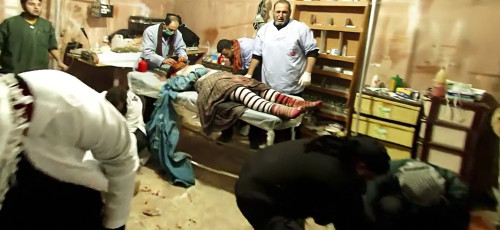Speaking with Syria Deeply, Dr. Fouad M. Fouad has detailed the crisis in Syria’s health care system after four years of conflict.
Fouad was the director of the Primary Health Care Department in Aleppo, but has left the country to become an assistant research professor at Lebanon’s American University of Beirut.
He outlines the evolution of the crisis, with “the medications available to the patients [now] less than 20% of what was available”:
The health care problems were triggered by the collapse of the infrastructure in areas that were under regime control. That led to the spread of contagious diseases, mainly Hepatitis A, diseases related to lack of water sanitation, typhoid, lipidosis, diarrhea. In addition, the services that could be offered and given to women have suffered a lot. We have had cases of unsafe child delivery. The problems resulting from that were numerous including, complications, bleeding and eventually death.
Because the Syrian crisis has [continued over] a longer time, we began to see problems in treating chronic illnesses such as kidney failure, cancer, diabetes, heart operations, and others. These illnesses got more complicated because the proper treatment is not available, or is very expensive. Many of the healthcare sector workers have left the country for fear of being targeted or kidnapped. They sought a safe place outside the country, and that placed a bigger burden on the system inside the country.
Fouad says more than 77% of the hospitals are no longer operating or have been damaged severely. More than 15,000 doctors, many of them highly-qualified specialists, have left Syria. Women are at risk as “child deliveries are conducted most of the time under unsafe conditions, especially in areas where the war is still raging”. Staff in opposition-held territory, often under Syrian military siege, have to get medicine through smuggling, so the quality and safety is not assured:
In areas outside regime control, there is lack of information about the kind of healthcare problems that we face or may face. If we have a problem with diarrhea or polio, the evaluation of these problems is left to the estimation of average people who so often have no experience. We need to know who is providing medical aid and who decides how to distribute it. Unfortunately, there aren’t enough efficient personnel with medical backgrounds to prioritize. As a result we have seen some tragic deaths resulting from medical complications and vaccines.

